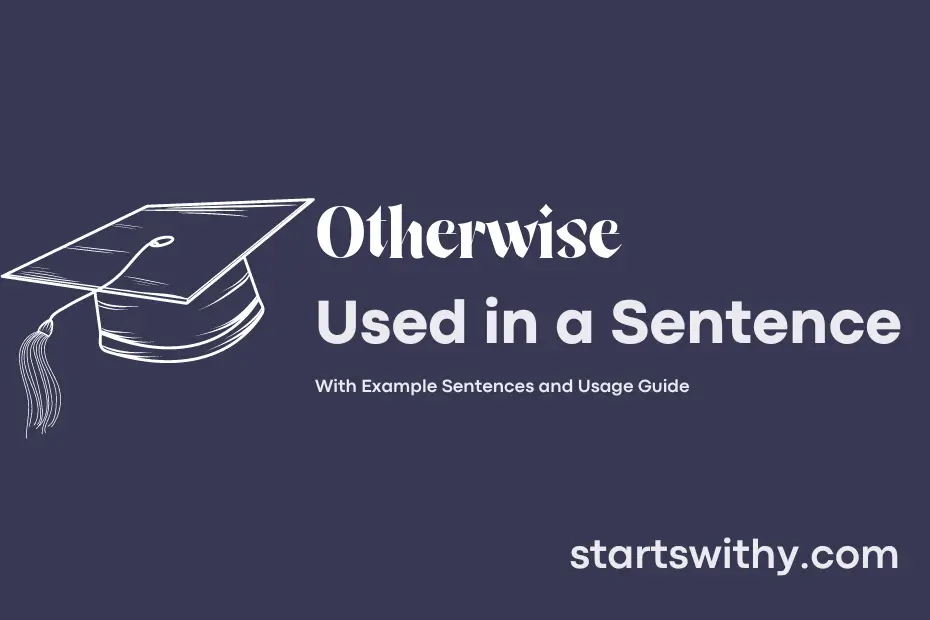Struggling to understand how to use “otherwise” in a sentence? Let’s simplify it for you. “Otherwise” is an adverb that signifies an alternative or different outcome from the present course of action. It is used to introduce a contrasting situation or condition that would occur if the current circumstances were different.
In writing, “otherwise” serves as a valuable tool to demonstrate hypothetical scenarios, provide alternatives, or highlight contrasting conditions. With a clear understanding of its usage, you can enhance the clarity and cohesiveness of your sentences.
7 Examples Of Otherwise Used In a Sentence For Kids
- Sit properly on the chair, otherwise you may fall down.
- Put on your shoes before going outside, otherwise your feet might get dirty.
- Eat your vegetables during lunchtime, otherwise you won’t get strong.
- Listen to your teacher in class, otherwise you’ll miss learning new things.
- Remember to wash your hands before eating, otherwise you may get sick.
- Share your toys with your friends, otherwise they might feel sad.
- Look both ways before crossing the road, otherwise you could get hurt.
14 Sentences with Otherwise Examples
- Otherwise, you may not be eligible for the scholarship.
- Make sure to submit your assignment on time, otherwise there will be a penalty.
- Attend the guest lecture tomorrow, otherwise you might miss important information.
- Start preparing for the exams now, otherwise you’ll be cramming at the last minute.
- Take notes during the lecture, otherwise you might forget important details.
- Stay focused during group discussions, otherwise you may not contribute effectively.
- Make sure to read the recommended textbooks, otherwise you may struggle to understand the concepts.
- Look for part-time job opportunities, otherwise you may face financial difficulties.
- Organize your study schedule, otherwise you may feel overwhelmed with the workload.
- Participate in extracurricular activities, otherwise you’ll miss out on building important skills.
- Connect with your professors during office hours, otherwise you may not get the support you need.
- Get involved in internships and projects, otherwise you’ll lack practical experience.
- Stay updated with campus events, otherwise you may miss out on networking opportunities.
- Seek guidance from career counselors, otherwise you may struggle with finding the right job after graduation.
How To Use Otherwise in Sentences?
Otherwise is used to introduce an alternative situation or choice in a sentence. It is often used to show the outcome if the main condition is not met.
To use Otherwise in a sentence, first, identify the main condition or situation. For example, “I will go to the beach if it’s sunny.”
Next, introduce the alternative situation using Otherwise. For instance, “I will stay home and read a book otherwise.”
In this example, Otherwise indicates that if the main condition of it being sunny is not met, the alternative action of staying home and reading a book will occur.
It’s important to remember that Otherwise is typically used to contrast two different outcomes or choices. Make sure to clearly state the main condition first before introducing the alternative with Otherwise.
Here are a few more examples of how to use Otherwise in a sentence:
– “I will buy strawberries for the cake, otherwise I will use blueberries.”
– “Please submit your project report by Friday, otherwise it will not be considered for review.”
– “Remember to study for your exam, otherwise you may not perform well.”
By following these guidelines, you can effectively use Otherwise to convey alternative possibilities in your sentences.
Conclusion
In conclusion, the use of the keyword “otherwise” in sentences serves to communicate contrasting outcomes or conditions. By introducing a different perspective or condition, “otherwise” helps to clarify choices, preferences, or consequences in a sentence. Whether indicating an alternative scenario, presenting an exception, or expressing a contrasting idea, sentences with “otherwise” provide clarity and help to convey a specific message effectively. The keyword “otherwise” is a powerful tool in writing, allowing for the clear communication of contrasting possibilities or conditions within a sentence, enhancing overall readability and understanding for the reader.



